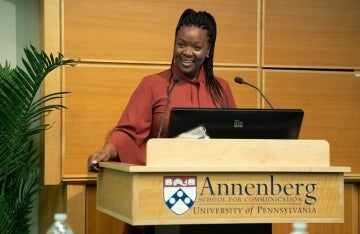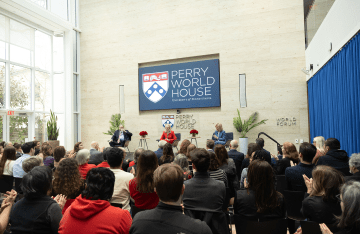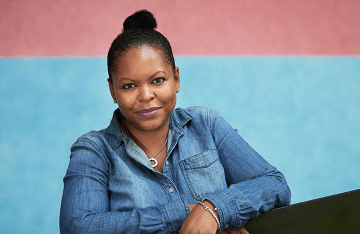Annenberg Public Policy Center Celebrates 30 Years of Research and Engagement That Matter
For three decades, the Annenberg Public Policy Center has addressed the role of communication in politics, science, health care, civics, and more.
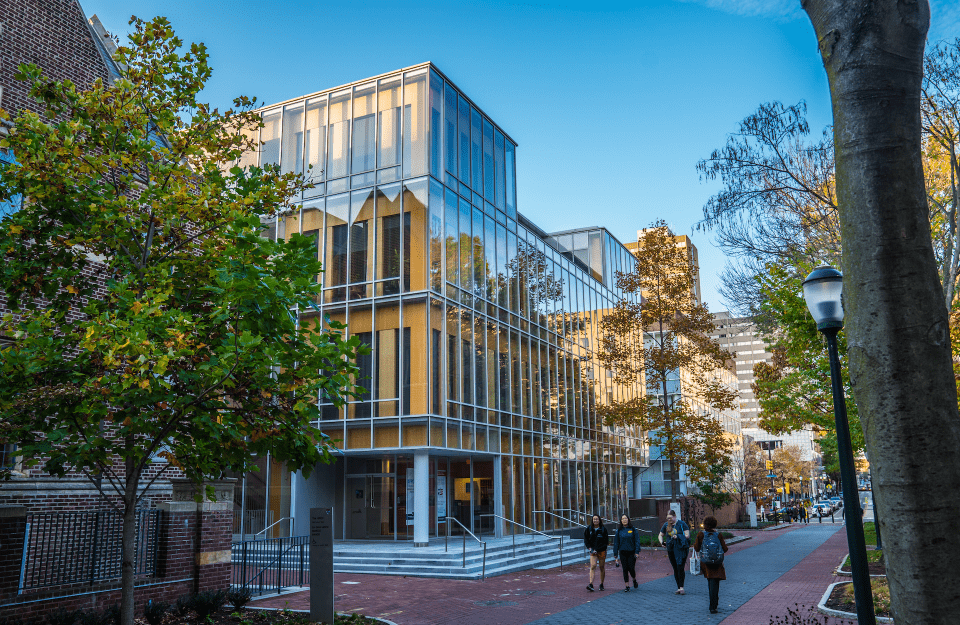
The Annenberg Public Policy Center (APPC) celebrated its 30th anniversary this month with a luncheon honoring the work of its former postdoctoral and FactCheck.org fellows and the expansion of its research initiatives with a new Climate Communication division led by Annenberg School for Communication psychologist, neuroscientist, and Vice Dean Emily Falk.
“We have a lot to celebrate,” APPC Director Kathleen Hall Jamieson said on April 1 to the 60 guests in the center’s Agora, where the staff was joined by scholars who are part of APPC’s postdoctoral network, scholars from across the Penn campus, and distinguished guests who have led APPC’s cross-campus partnerships. “We also are celebrating the launch of our new Climate Communication division. It’s official, it’s endowed, and Emily Falk is going to lead it,” said Jamieson.
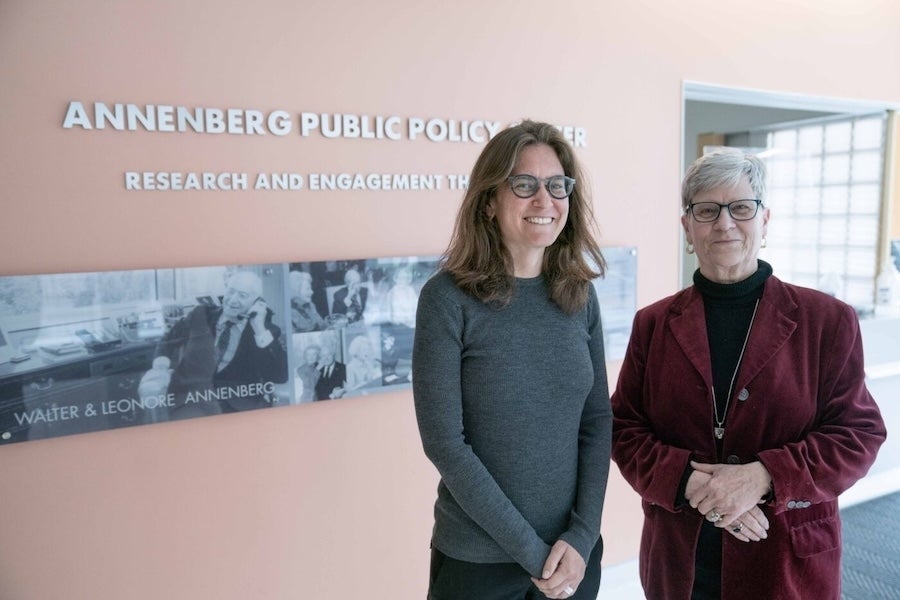
The creation of the Climate Communication division was announced at the opening plenary session of the Society for Environmental Journalists annual conference, hosted by APPC this month at the University of Pennsylvania in celebration of the new Penn Center for Science, Sustainability, and the Media, directed by climate scientist Michael Mann.
The Climate Communication division is the third of APPC’s endowed research divisions, joining the Communication Science division headed by Penn Integrates Knowledge Professor Dolores Albarracín and the Institutions of Democracy division headed by political science professor Matt Levendusky.
New Leadership for the Leonore Annenberg Institute for Civics
Jamieson also announced that as of June 1, APPC distinguished research fellow R. Lance Holbert will become a research professor at the Annenberg School and director of APPC’s Leonore Annenberg Institute for Civics (LAIC).
The luncheon featured presentations by two of the leaders of Penn centers with which APPC has partnered as part of its Collaborative Centers initiative, Penn psychologist Martin E. P. Seligman and Children’s Hospital of Philadelphia pediatrician Flaura Winston.
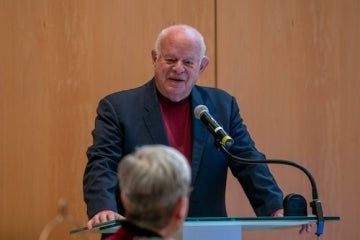
Seligman, director of Penn’s Positive Psychology Center, “has done more with the policy center and has more familial associations with us than any other person,” said Jamieson, who announced that the policy center is honoring Seligman by naming a new postdoctoral fellowship for him.
Among Seligman’s many ties to APPC, Jamieson said, are that his daughter, Lara, now a reporter at Politico, had been a FactCheck.org undergraduate fellow when at Penn. And years ago, in the early days of the development of positive psychology, APPC helped to fund Seligman’s early work in positive psychology. “We’re extraordinarily proud of the fact that the work was developed at Penn, and developed by someone who is part of our extended family,” Jamieson said.
When APPC, in partnership with The Annenberg Foundation Trust at Sunnylands, convened seven commissions of mental health experts to develop the award-winning “Treating and Preventing Adolescent Mental Health Disorders” (Oxford, 2005; updated 2017), Seligman chaired the commission on positive youth development and edited that section of the book.
Positive Psychology and Adolescent Motor Vehicle Accidents
In his presentation, Seligman reviewed his long-term efforts to reimagine psychology’s major goals as not just focusing on the mentally unhealthy. His work has blossomed into an international effort focusing on the positive side of mental health, with major international innovations in the measurement of well-being, educational programs to help young people thrive, and the development of graduate and undergraduate programs in positive psychology. To the delight of the audience, Seligman also previewed a new AI chatbot created by a former student that is playfully named “Ask Martin.” Speaking in a voice replicating Seligman’s, the chatbot can respond in English or Mandarin to queries with answers drawn from the distinguished psychologist’s work.
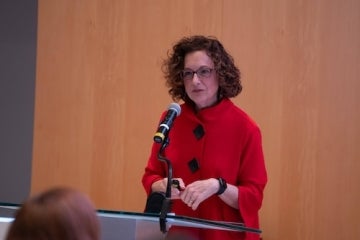
Introduced by APPC research director Dan Romer, Winston is scientific director and founder of the Center for Injury Research and Prevention at CHOP. Winston discussed her latest interest in reducing the No. 1 cause of injury in adolescents: motor vehicle crashes. This work follows her earlier efforts to reduce injuries suffered by infants and young children who were insufficiently constrained in moving vehicles, leading to the widespread adoption of car seat requirements for children. In her current work, she has developed a computer-based virtual driving assessment that in just 15 minutes can test a teen’s ability to handle the most frequent crash scenarios. The program can predict teenage crashes over the first year of independent driving and provide feedback to young drivers about the skills they need to be safer. The test is now implemented in the CHOP primary care network as part of routine care for adolescents.
APPC Celebrates Postdoctoral and FactCheck.org Fellows
The luncheon was bookended by tributes to the achievements of APPC’s former postdoctoral fellows and former Penn undergraduate fellows at FactCheck.org, a project of the policy center co-founded by Jamieson and journalist Brooks Jackson in 2003.
The luncheon, which drew six current and nine former postdoctoral fellows, opened with video clips of more than 20 former postdocs offering snapshots of their research during their time at APPC and afterward.
These began with Marco Yzer, who worked in 2000-01 with ASC professors Joe Cappella and Marty Fishbein on research into the effects of anti-drug public service announcements on adolescents, and now works in strategic mental health mass communication at the University of Minnesota; Katy Barnhart (2015-16), a research civil engineer with the U.S. Geological Survey, who did research in science communication with Jamieson, and now works on public perceptions of complex climate observations; Asheley Landrum (2015-2017) of Arizona State University, who worked with visiting scholars Dan Kahan of Yale University and Bill Hallman of Rutgers University on the effects of the Pope’s encyclical on climate change, and now researches how people process science information; and Ivy Defoe (2017-18) at the University of Amsterdam, who worked with Romer on youth risk behavior and now examines online influences on adolescent behavior.
In the final segment of the celebration, Jamieson introduced video messages from nearly a dozen former FactCheck.org fellows on how their work at APPC helped to shape who they are today. As former fellow Lukas Isakowitz (2012-13), today a climate finance advisor for the U.S. Agency on International Development, said, “I’m really grateful for my time at FactCheck.org. It instilled in me the importance of finding simple but reliable sources of information to answer complex and difficult-to-answer questions.”
See more photos of the event at the Annenberg Public Policy website

